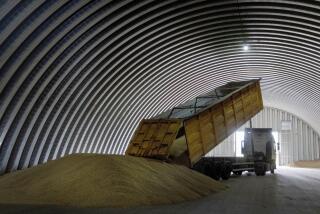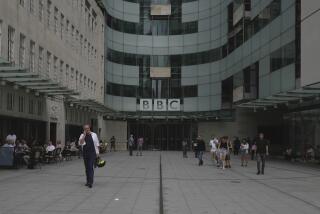With nearly half its food imported, who will feed Britain after ‘Brexit’?
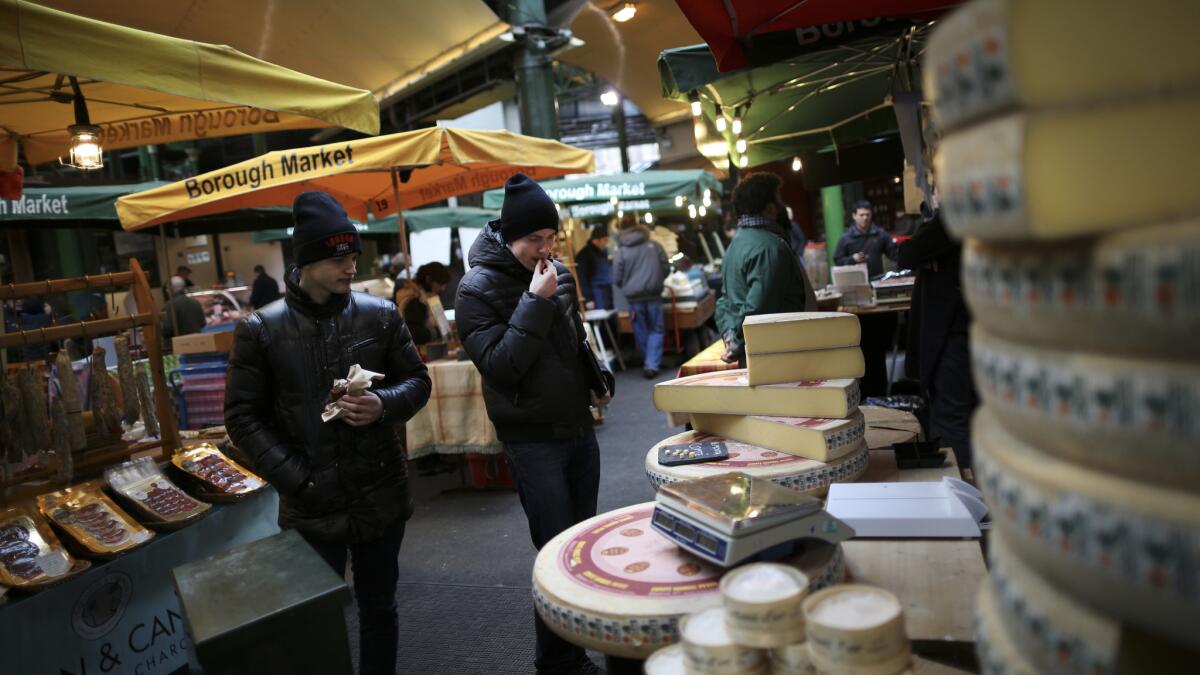
At the Borough Market here, the stalls showcase Spanish hams, French and Dutch cheeses, Croatian fig cakes, Italian truffles and other delicacies from across the European Union.
The market recently was packed with tourists taking advantage of the British pound’s slide against other currencies in the wake of the country’s vote to leave the European Union. But the vendors were not celebrating.
“Brexit” has sown deep uncertainty in Britain’s food system, which for the last 43 years has been entwined with the rest of Europe’s, relying heavily on the EU for everything from pork to peaches to farm subsidies to the labor that picks its tomatoes. Now, the country is going to have to rethink how it feeds itself, from farm to fork.
“Food is the biggest sector of engagement with Europe,” said Timothy Lang, a professor at City University London’s Center for Food Policy. “It’s hundreds of thousands of contracts, all woven into long supply chains.”
Currently, European laws regulate nearly everything that ends up on British plates: how clean a chicken should be before slaughter, how cold to keep frozen cod, who gets to call their biscuits “gluten free.”
Now, Britain will have to decide all that for itself. Some groups already have begun lobbying Prime Minister Theresa May’s new government for regulations to improve animal welfare and protect soils.
But what Britain can’t do is feed itself. The country imports more than $50 billion a year in food, or nearly half of what it eats. That’s more than double what it exports. Most wine and beef come from mainland Europe, as do about 40% of fruit and vegetables.
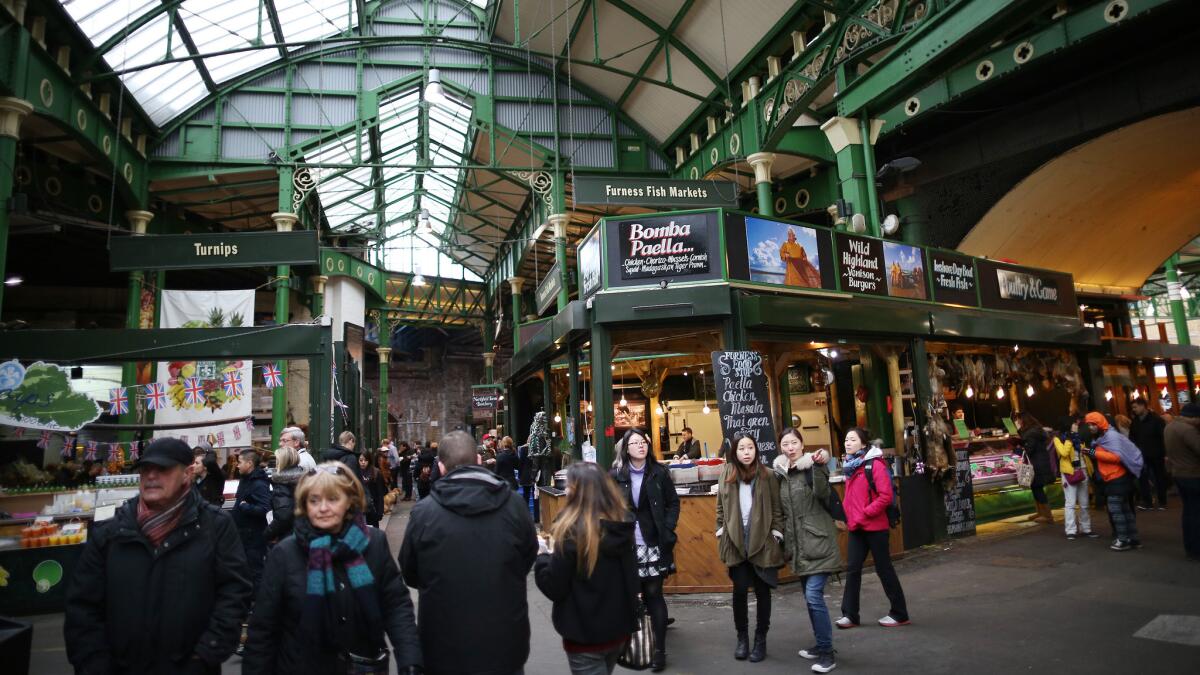
The government claims the nation has enough food in stock to feed itself for five days — though Lang and other analysts said the supply is closer to three days.
The future of food in Britain will depend largely on what sort of trade deals the government can strike with the European alliance it is preparing to abandon.
Germany and other European powers have made it clear that they will not grant Britain the benefits of EU membership if it leaves and that the country probably will face tariffs on many of its imports.
New tariffs on food would drive up prices and potentially change the nation’s diet.
Fresh fruits and vegetables often are the first items struck from shopping lists in a household budget crunch. They often are replaced with cheaper, processed foods.
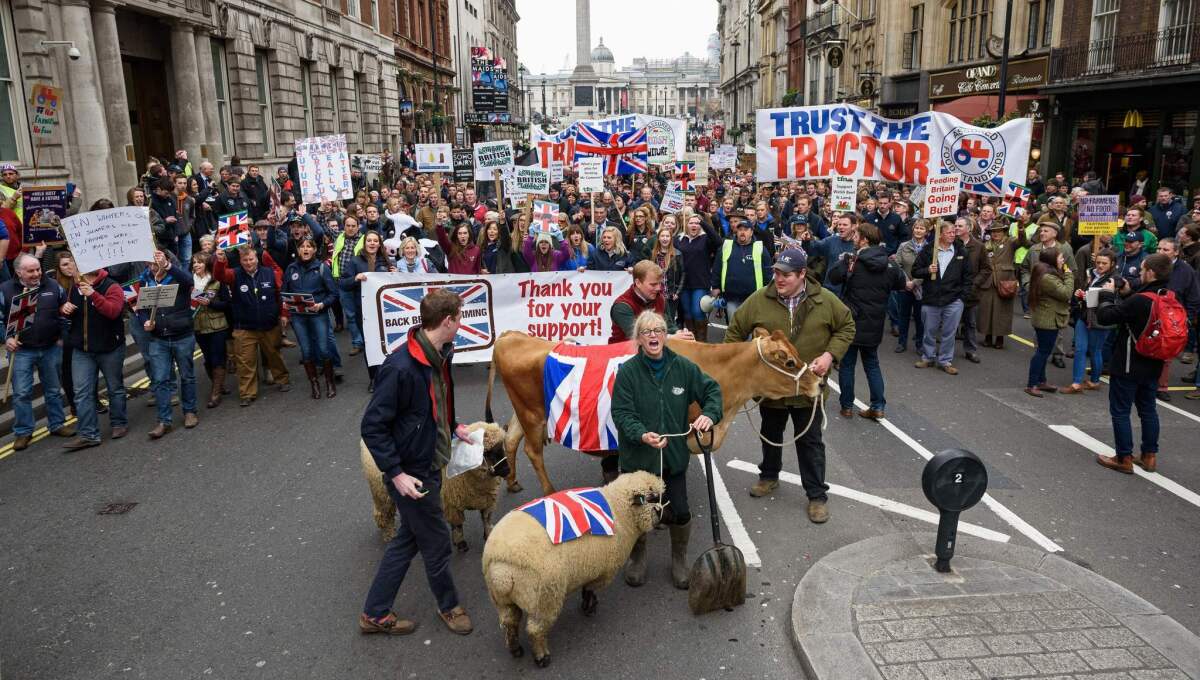
“Unhealthy foods are three times cheaper here than healthy ones, per calorie,” said Anna Taylor, executive director of the Food Foundation think tank. “If you haven’t got that much money, you’ll choose empty calories, food laden with fat, salt and sugar, that will fill you up.”
More than 8 million Britons already are struggling to put food on the table, the group estimates.
Lang suggested that in their nostalgia for an independent Britain of the World War II era, Brexit supporters never considered the consequences for their dinner plates.
“These Brexiteers want to take us back to a Churchillian era?” he said. “Well, let them eat Spam.”
Lianne Gordon, a seamstress from Brighton, said she’s saddened by Britain’s pending departure from the EU but added she’ll survive just fine. “You can get a sack of potatoes or beans, and that will last you for ages,” she said. “I’m not a fussy eater. I love potatoes and cabbage.”
Britain’s own produce growers are unlikely to come to the rescue, as they’ll probably be facing at least two Brexit challenges: the loss of nearly $4 billion a year in EU farm subsidies and a labor shortage.
EU membership has brought them a flexible, energetic and mobile labor force of Romanians, Bulgarians and other Eastern Europeans. While EU-born workers from outside Britain make up 6% of the country’s workforce, they account for more than a quarter of employees in the food manufacturing industry — and 95% of crop pickers.
“Every strawberry eaten at Wimbledon was picked by an Eastern European,” said John Hardman of Hops Labour Solutions, an agricultural recruitment firm in Kenilworth. “Every Brussels sprout eaten at Christmas dinner was picked by an Eastern European.”
If Britain stops free movement of EU workers, farmers may struggle to find replacements. Britons themselves don’t seem keen on the low wages and long hours in the orchards and fields.
Over the last few weeks, Hardman has seen a drop in the number of foreign horticultural workers applying for jobs because of the weakness of the British pound and, he speculated, the post-referendum rise in anti-migrant hate speech.
“The Eastern Europeans can now work closer to home, at a better rate of pay,” he said. “If that workforce disappears, there will be no one to pick soft fruit or lettuce. In two to three years’ time, that’s a real possibility.”
Stuart Agnew, a pro-Brexit member of the European Parliament, suggested that Britain could prevent a labor shortage by reviving a program that gave seasonal workers short-term visas. “We don’t have to be in a political union with 540 million other people to find 40,000 fruit pickers,” he said.
Back at the market in London, price increases caused by the weakness of the pound offer a preview of what may come.
Belgian beers cost more than they did a month ago. Gerald Dorrity, a salesman at the craft beer stall Utobeer, said new tariffs would especially hurt independent brewers, as it would become more expensive to import hops and fruits for specialty brews, such as this summer’s popular Blood Orange India Pale Ale.
“Some brewers may have to change their recipes,” he said, “and when a brewer makes their name on consistency, that can hurt.”
At a nearby stall, a woman selling Italian mushrooms worried whether she’ll be allowed to stay in Britain if it leaves the EU.
Greta Sabaliauskaite was born in Lithuania but moved to London when she was 7 and has lived here for more than a decade.
“Since the vote, I’m getting a lot of customers asking if I was born here or not,” she said. “I can’t go back to Lithuania — I barely even speak the language there.”
In the meantime, she already knows she’ll be charging more for her mushrooms. She had just received a letter from a supplier announcing price increases.
Her Italian boss, Stefania Sautto, said she’s not worried about the future of the business.
“The British have grown used to eating like Europeans,” she said. “They won’t give all this up.”
Power is a special correspondent.
ALSO
What’s safe? Europe grapples with security after attacks
Muslims in France attend Catholic Mass to show solidarity after attack on priest
Taliban claims responsibility for bombing of compound for foreigners in Kabul
More to Read
Start your day right
Sign up for Essential California for news, features and recommendations from the L.A. Times and beyond in your inbox six days a week.
You may occasionally receive promotional content from the Los Angeles Times.

